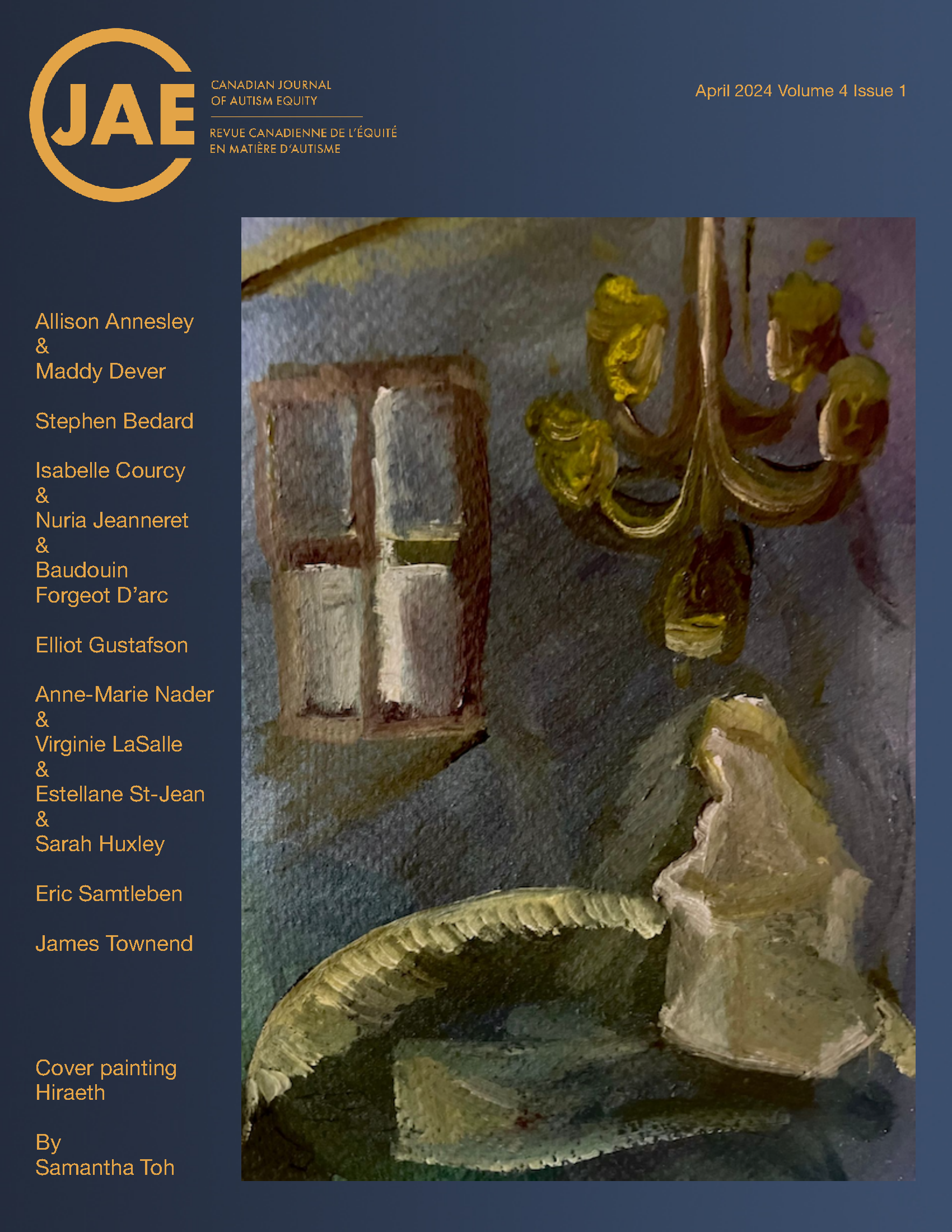British Columbia’s Autism Funding Policies
Benefits and Gaps
DOI:
https://doi.org/10.15173/cjae.v4i1.5669Keywords:
autism, autism policy, early intensive behavioural intervention (EIBI), Canada, British Columbia (BC)Abstract
Autism Spectrum Disorder (ASD) affects one out of 100 children worldwide (World Health Organization, 2023). In Canada, public debates about policies related to autism funding have been ongoing. This research paper provides an analysis of the autism funding policies in British Columbia from inception to present day. Using an economic, social, and educational lens, this paper will examine the progress that has been made to support children living with ASD over two decades and the issues that exist within current autism funding policies that require addressing to improve access and quality of care, support services, and education for those with ASD.
References
Anderson et al v. Attorney General of British Columbia (BCSC August 22, 2003).
Auton et al v. The Attorney General of British Columbia and Medical Services Commission of British Columbia (CanLII June 9, 2004).
American Psychiatric Association (2013) Diagnostic and statistical manual of mental disorders (5th) DSM-V. Washington, DC.
Bottema‐Beutel, K., Crowley, S., Sandbank, M., & Woynaroski, T. G. (2021). Research Review: Conflicts of Interest (COIs) in autism early intervention research – a meta‐analysis of COI influences on intervention effects. Journal of Child Psychology and Psychiatry, 62(1), 5–15. https://doi.org/10.1111/jcpp.13249
Changes to Autism Programs and Increase Funding and Equity. (2009, September 16). British Columbia. Retrieved July 4, 2023, from www.gov.bc.ca.
Delaney, J. G. (2017). Education Policy: Bridging the Divide between Theory and Practice. Brush Education Inc.
Dreaver, J., Thompson, C., Girdler, S., Adolfsson, M., Black, M. H., & Falkmer, M. (2019). Success Factors Enabling Employment for Adults on the Autism Spectrum from Employers Perspective. Journal of Autism and Developmental Disorders.
Dua, V. (2003, March). Standards and guidelines for the assessment ... Provincial Health Services Authority. http://www.phsa.ca/Documents/asd_standards_0318.pdf
Emily Chivers Yochim & Vesta T. Silva (2013) Everyday Expertise, Autism, and “Good” Mothering in the Media Discourse of Jenny McCarthy, Communication and Critical/ Cultural Studies, 10:4, 406-426, DOI: 10.1080/14791420.2013.841320
Freeman, S. (1997). Solution to the Human Suffering and Social Cost of Autism: An Information Brief to Members of Parliament, F.E.A.T. of BC https://www.featbc.org/files/lobby_and_advocacy/FEATBCbrief.pdf
Government Pledges Continued Support for Autism. (2004, November 19). British Columbia. Retrieved July 4, 2023, from www.gov.bc.ca.
Hunter, P. (2023). Autism therapy at crossroads: Autism research requires stronger and more reliable evidence base for efficiently applying therapeutic interventions: Autism research requires stronger and more reliable evidence base for efficiently applying therapeutic interventions. EMBO Reports, 24(3), e56915–e56915. https://doi.org/10.15252/embr.202356915
Ikalyuk L. and Kuzmyn O. 2015. Psycholinguistic Characteristics of Autists and Their Prototypes in American Cinema Discourse (Based on the Films "Rain Man" and "The Real Rain Man"). Journal of Vasyl Stefanyk Precarpathian National University. 2, 2-3 (Jul. 2015), 87-93. DOI: https://doi.org/10.15330/jpnu.2.2-3.87-93.
Kent H. BC families win suit over government payment for expensive autism therapy. CMAJ. 2000 Oct 31;163(9):1181. PMID: 11079068; PMCID: PMC80260.
MacLeod, A. & Johnston, P. (2007) ‘Standing out and fitting in: a report on a support group for individuals with Asperger syndrome using a personal account’, British Journal of Special Education, 34 (2), 83–89
MacLeod, A., Lewis, A., & Robertson, C. (2013). “Why should I be like bloody Rain Man?!” Navigating the autistic identity. British Journal of Special Education, 40(1), p. 41- 49.
MacPhail, A., Syme, R., Gorman, J., Keller, C., & Ahmed, S., Ministry of Children and Family Development 1–19 (2004). Victoria, BC; BC Government.
Manfredi, C. P., & Maioni, A. (2005). Reversal of Fortune: Litigating Health Care Reform in Auton v. British Columbia. Osgoode Hall Law School.
Ministry of Children and Family Development. (2009, September 16). Changes to autism programs increase funding and equity. British Columbia. https://archive.news.gov.bc.ca/releases/news_releases_2009-2013/2009CFD0003-000348.htm
Murray, D. (2006) Coming Out Asperger: diagnosis, disclosure and self-confidence. London:
Shepherd, C. A., & Waddell, C. (2015). A Qualitative Study of Autism Policy in Canada: Seeking Consensus on Children’s Services. Journal of Autism and Developmental Disorders.
Statistics Canada. (2023, August 30). Labour market characteristics of persons with and without disabilities in 2022: Results from the Labour Force Survey. https://www150.statcan.gc.ca/n1/daily-quotidien/230830/dq230830a-eng.htm
Tarbox, Jonathan., Dixon, D. R., Sturmey, Peter., & Matson, J. L. (Eds.). (2014). Handbook of Early Intervention for Autism Spectrum Disorders Research, Policy, and Practice (1st ed. 2014.). Springer New York. https://doi.org/10.1007/978-1-4939-0401-3
Whitman T (2004) The development of autism: A self- regulatory Philadelphia, PA: Jessica Kingsley Publishers.
World Health Organization. (2022). Autism. World Health Organization. https://www.who.int/news-room/fact-sheets/detail/autism-spectrum-disorders
Zeidan, J., Shikako-Thomas, K., Ehsan, A., Maioni, A., & Elsabbagh, M. (2019). Progress and Gaps in Quebec’s Autism Policy: A Comprehensive Review and Thematic Analysis.
Downloads
Published
How to Cite
Issue
Section
License
Copyright (c) 2024 Elliot Gustafson

This work is licensed under a Creative Commons Attribution-NonCommercial-ShareAlike 4.0 International License.
Authors retain copyright and grant the journal the right of first publication with the work simultaneously licensed under a Creative Commons Attribution License that allows others to share the work with an acknowledgement of the work's authorship and initial publication in this journal.
Authors are able to enter into separate, additional contractual arrangements for the non-exclusive distribution of the journal's published version of the work (e.g., post it to an institutional repository or publish it in a book), with an acknowledgement of its initial publication in this journal.
CJAE accepts articles that have not been published in any other journals/proceedings, unless copyright permission is assured, and have not been submitted for consideration to any other journals/proceedings at the time of submitting to the Canadian Journal of Autism Equity for consideration. While a paper is under consideration by CJAE, you agree not to submit the work to other journals/proceedings until review by CJAE is completed and a decision has been rendered.



